
The pimple that showed up on Bernard’s chin felt like a small volcano. Google said squeezing it would only drive the bacteria deeper into the epidermis, so he left it alone.
“What’s that thing on your face?” Anne Lavelle asked the minute he walked into the gallery. She was one of those people who said whatever popped into her head. As Bernard’s partner in Sauser + Lavelle Gallery, Anne was the one more responsible for the business end of things, and though it wasn’t logical, she knew from experience that the way she and Bernard appeared, even though it was irrelevant to the art, had a way of affecting things. With the insipid and stupidly rich Fred and Julie Keyes due at the gallery to choose a Molly Upton painting for Fred’s office, Anne considered Bernard’s blemish a threat to the sale.
Ignoring the question, Bernard continued scrolling through the texts on his phone. “Go ahead, don’t answer me,” Anne said. “But if you want that thing to ever go away, you’ll need to apply hot compresses to it several times a day and use some benzoyl peroxide ointment.” She was in her element when ordering him around. “And don’t fuss with it,” she added sternly. “But since the Keyes are due any minute, let me do this one little thing.” Anne retrieved a small beige stick from her purse and dabbed its end onto his bump.
“There,” she said, stepping back to assess her handiwork. “Keep your distance from Julie and the sale will be a breeze.” Bernard did as he was told, and the sale went through.
A month later, however, hot compresses and nearly an entire tube of RapidClear acne cream notwithstanding, Bernard’s pimple had morphed into a subcutaneous ball bearing. Anne suggested Bernard see her dermatologist, Silvia Hernandez, who turned out to be a stunning, thirty-something woman with olive skin as smooth as the proverbial baby’s bottom. As he sat on the exam table, his legs dangling over the edge, Bernard felt an atavistic flush of adolescent desire spread across his face. Dr. Hernandez pulled on some latex gloves and stared through her magnifying glass at his chin. After prodding the pimple ever so lightly, she stepped back and said, “This is known as a ‘blind pimple’ or ‘cystic acne.’ It happens when pus gets trapped under the skin. I admit I’m a bit surprised to see something this big on a man your age, but a shot of cortisone should get rid of it in a couple of days.”
Afterward, sitting in his car in the hot parking lot with the key in the ignition, Bernard stared dully through the windshield at the pale brown Medical Arts building he’d just exited. The summer morning was already causing splotches of wetness to appear under the arms of his otherwise pale blue polo shirt. The planet is rapidly warming and drowning in plastic, Bernard thought, man-made toxins are killing humans and animals alike, wars are going on everywhere, children are dying of incurable diseases, and here I sit, a middle-aged white guy who sells useless abstract paintings to fatuous rich people, seeing a doctor about a zit.
On his drive back to the gallery, Bernard found a way to reason towards forgiveness. It wasn’t his fault that he lived in a wealthy first-world country filled with postmodern neurotics like Anne – and him, for that matter – for whom a pimple represented an imperfection that might actually kill a business deal. He was doing the best he could with the hand Fate had dealt him.
Anne knocked twice before opening the door to Bernard’s office, where she found him busily typing on his laptop. She was handling the hot, humid weather by wearing a maxi-length black sleeveless linen shift and pulling back her curly reddish hair into a silk polka-dot scrunchie. As with many women staring down the barrel of sixty, she was able – by investing money, time, and energy in just the right amount of surgery, Botox, and expensive makeup – to tell herself she could pass for a woman not yet fifty.
Bernard briefly looked up and said, “Nice dress,” before returning to typing. He took superficial pride in having as a partner a woman like Anne, whose taste in clothes was elegantly minimalist. He added, “I’m emailing you now with details about my trip and a phone number where you can reach me while I’m gone.”
“Thanks, I was going to ask for that,” Anne said, leaning her shoulder against one of the door’s side jambs. She paused before saying, “So, tell me, how was Silvia?”
“Fine. She injected the thing with steroids and said it should be gone in a few days,” Bernard said, not looking up.
“I told you she’s great,” Anne said. “If you decide you want a little Botox, she’s great with that, too. Anyway, sounds like you’ll soon be back to the devilishly handsome Bernard that Alice and I know and love, heading off with confidence to that idiotic Maverick Grove.”
Bernard ignored her remark and continued typing.
“I still can’t fathom why you want to go to that place,” Anne said. “The Maverick Club is absurd, and its summertime Grove is doubly absurd. Any club in this day and age that won’t admit women and has only token minority members is unacceptable. End of story.” Anne paused for effect. “Are you listening, Bernard? The very existence of the Maverick Club is offensive to women and minorities.”
Bernard stopped typing and looked up at her, but still said nothing.
“The current members are the biggest problem,” Anne said. “They’re political troglodytes who glorify individual rights – and in case you hadn’t noticed, that’s code for racism. They think belonging to the Maverick Club makes them smarter and more interesting and better than the rest of us parvenus. Have you even looked at the roster of members? Maybe way back in the 1970s it included some genuinely interesting intellectuals, but today it’s nothing but a man-cave for right-wing assholes.”
Bernard softly closed his laptop and stood up. “Once again, Anne,” he said, placing his hands on his hips, “I’m not joining the club. I’m simply a guest of a club member at their annual summer retreat. Do you really need reminding that it’s Rob Wainwright – my friend and your erstwhile lover – who’s invited me? He’s the rare bird who went to Harvard and actually learned something there, and he’s hardly a right-wing asshole.”
“But what about Alice? You’re fine with leaving Alice, the woman you call your one-and-only, while you go off to yammer about philosophy with a bunch of self-satisfied men just so all of you can pretend you’re real thinkers?”
“Alice is fine with it,” Bernard answered evenly. “When she went to Santa Fe for a week with her college girlfriends last summer, I was fine with that as well. Alice and I share an interest in Roman history. She sees the Grove as a modern-day version of the Roman otium – a thinking man’s reprieve from the stresses of ordinary life – and she actually wants me to go.”
Anne said nothing. Since he’d fallen head over heels in love with Alice a year and a half ago when the two of them had been standing online together waiting to vote, all she’d heard from him was how Alice was beautiful, Alice was brilliant, Alice adored his cat Mondrian, Alice was wonderful with his two teenage sons, and even, improbably, Alice was an angel to his ex-wife Cindy.
Bernard softened. “Yes, many of the men in the club are right-wing hedge-fund types. But there are also a lot of liberals with diverse interests and occupations. What links them is that they enjoy confronting big questions.”
“Listen, Socrates,” Anne said, standing up straight and firmly crossing her arms. “Philosophizing makes people depressed. Look at what it’s done to you – made you uncertain about everything.” She turned almost nasty. “Like artists, and unlike you, I prefer action – getting things done – to words.” The sound of Sinead answering the phone at the front desk made them both momentarily freeze, for they rarely got calls on a hot summer morning, but it turned out to be nothing.
“I’m not saying I can produce a painting,” Anne said. “I’m just saying I understand the pitfalls of making art for any artist who thinks too much about it. Anyway, this argument is getting us nowhere. I get that you need a break from me and the gallery, and for all I know, even from Alice. But why does it have to be at the Maverick Grove with those guys?” She started to leave but turned around. “In many ways you’re a fascinating man, Bernard, but in others you’re a jerk. How managing a fucking motel for ten years led to your decidedly elitist outlook on art, I’ll never figure out.”
“You mean because I’m not afraid to pass judgment on the quality of an abstract painting I’m an elitist?” Bernard asked.
Anne thought for a second. “That’s precisely what I mean. For some reason you don’t get that the art business is totally subjective – that beauty is in the eye of the beholder. You’re sure you’ve got some kind of special eye for detecting ‘quality’ that the rest of us don’t have, and you’re flat out wrong about that.”
With a hint of exasperation, Bernard said, “Anne, we make good partners because I decide on the aesthetics part and you decide on the business part. Besides, it’s too late for me to back out. I’ve made my reservations, Alice will be moving in and cat-sitting Mondrian and watering my plants, and I’m packed – sweatshirts, jeans, sunblock, insect spray, baseball cap, hiking boots – the works. And pimple cream.”
Anne offered only a limp, resentful smile. “Are you really going to do without phone and internet for two whole weeks?
“That’s a big part of why I’m going.”
Anne sighed. “I give up. Why is it,” Anne said, looking at the gallery’s ceiling, “that I’m suddenly hearing ‘Dueling Banjos’?” She added a “Duddle-dum-dum-dum,” as she walked down the hall.
Bernard followed Anne to her office and said, “Don’t worry. I’ll be fine. I’ve just emailed you the address and an emergency phone number. I’m staying in one of twenty-five log cabins, eight guys to each cabin. Each cabin is named after a famous philosopher, and I’m assigned to Epicurus, who thought the senses are the true source of knowledge – my kinda guy, right? Pierre Durand, the chef from Chant du moineau, is being brought in to cook the entire time.”
“Sorry, but not even two weeks of free meals from Durand could tempt me to go to that conclave of freaks,” Anne said.
Bernard tried another tack. “You remember that I’m a fan of Thoreau, right? Remember me telling you he went off to live in a cabin in the woods by himself in order to learn to ‘live deliberately’”? The Grove is my version of trying to learn to ‘live deliberately.’”
“A tad late for that, don’t you think? Anne said. “Anyway didn’t you also tell me Thoreau’s cabin life wasn’t as rustic as he made out? Didn’t his mother bring him sandwiches and do his laundry for him while he was living there?”
“OK, but aren’t we all fakes to some extent? That doesn’t take away from Walden,” Bernard said, proud to have made his point. “Anyway, the Grove makes no pretense of being rustic. The cabins have electricity and heat. We do sleep on bunk beds, but Rob says they’re extra wide and actually comfortable. Plus there are two bathrooms per cabin and a hot-water shower outdoors in the back. Just think of me showering outside while howling at the moon.”
Anne had ceased listening and was scrolling through Instagram.
*****
The conversation with Rob Wainwright during the long ride to the Grove moved rapidly from the dry and sunny weather forecast for the whole of the Lower Peninsula, to global warming, politics, Artificial Intelligence, nanobots and gray goo, the madness of the mathematician Alexander Grothendieck, the best bars and gyms in Chicago, whether the newly hired lawyer in Rob’s firm whom he wanted to date was age appropriate, the culture wars, the Cubs, the Bears, the Blackhawks, the Bulls,and finally – after Rob had parked his Audi in the lot at the entrance to the Grove where cars had to be left for the duration of the retreat, and they’d locked their phones inside the trunk – some lethargic banter about the newest Legend of Zelda game.
The thick heat of Chicago had been replaced by clean Michigan breezes and Bob Ross’s happy little clouds drifting slowly across the cerulean blue. Bags in tow, Bernard and Rob headed towards the dining room. Dressed in beige khaki shorts and pastel polo shirts, and with matching clean-shaven faces and baseball caps on top of their buzzed heads, they resembled each other to the point of caricature. Rob was the better looking, which Bernard – who had looked like a lumpy nerd until he started his gallery – knew full well. Now that Bernard was in his late fifties, however, with some fine wrinkles etched on his forehead and around his mouth, a body kept in fit by regular workouts, and a wardrobe of high-end clothes, he had turned into an almost handsome man – or at least one women found more handsome than when he’d been young.
“I take it you stay in Epicurus every year?” Bernard asked.
Rob turned to face him. “Hey, how’d you get the impression I’m in Epicurus? I’m an old-timer and I always stay in Aristotle,” he said.
Bernard laid his duffel on the ground. “I just assumed that since you invited me, we’d be in the same cabin.”
“Is this a problem? Rob asked. “The decisions about who stays where are made by a committee trying to mix and match invited guests with members in a way that’s stimulating for everyone.”
“Just asking,” Bernard said, picking up his duffel. “No problem at all.”
*****
After lunch on a shady patio outside the dining hall, Bernard and Rob headed off to their respective cabins. Dropping his duffel onto his assigned upper bunk, Bernard changed his shirt and walked out onto the front deck to join his cabin mates. Frederick Ostertag, a tall, thin, theater critic from Phoenix, was prattling on about the lack of nationwide support for theater critics. He was followed by Mike Hanesley, an avuncular astrophysicist who gestured wildly with a pretzel in his hand as he tried to explain his work in assaying the shape of the universe. Howard Stein, a fat international lawyer, bragged about what his firm had accomplished over the past year in helping corporations limit their carbon emissions. Bernard’s eyes drifted over to a shiny green beetle making its way along the deck railing. Suddenly, someone said his name and asked what it was he did. He was a Chicago art dealer whose focus was abstract painting. He couldn’t tell whether the ensuing silence signaled contempt or puzzlement.
It quickly became obvious that of the eight men in the cabin, six were already friends. Bernard and Mark Elliott, a former University of Chicago professor who now headed a contrarian think tank in southern California, were the newcomers (or, as Bernard thought to himself, the outsiders). Feeling alien and claustrophobic, Bernard said he needed to get the lay of the land and took a walk.
He went the length of Middle Path, a gently curving gravel road that functioned as the Grove’s main artery. The cabins were set far apart from one another, and far back from the road, keeping it all bucolic. Mature spruce, oak and hickory trees ruled the landscape. Jutting out of the scruffy yellowed grass were large rocky formations that had been there since the end of the glacial age, as well as muddy ponds edged with tall grasses that made Bernard wonder if mastodon bones lurked somewhere deep in their muck.
Bernard assessed that each cabin deck came with a couple of dark green Adirondack chairs and a single large pot of stolid red geraniums placed next to the door. Blonde pyrogravure signs inscribed with the names of various philosophers hung over the doorways. When he came to the cabin named Aristotle, which, like its next-door-neighbor Plato, was tucked farther back from Middle Path than the other cabins, he spotted Rob standing on the deck talking animatedly with a small group of men. He was about to shout out a greeting when he realized it would probably make him sound needy, and instead kept on walking.
Wandering off Middle Path, he found his way to Maverick Library and Maverick Lecture Hall, two small modern concrete buildings in a handsome Art Brut style that clashed severely with the rest of the Grove’s wooden buildings. Some powerful member, perhaps the architect himself, must have rammed them down the throats of the Board members. Following his little map, Bernard found his way over to Maverick Lake, where he sat down in one of two faded gray chairs positioned in the shade and with his eyes followed a swimmer trailing a red buoy.
Bernard quickly fell asleep. He was out for more than two hours before waking up and groggily walking back to his cabin, where he then joined his group as it was heading over to the dining hall. The old-timers formed a kind of noisy scrum, with Bernard and Mark Elliott trailing. Mark was a thin, lanky man who had five years or so on Bernard, and sported a head of thick white hair Bernard could only envy. He’d just awakened from a nap himself and apologized for being a lousy conversationalist. He told Bernard that after flying from LAX to O’Hare on a red-eye and driving a rental up to Michigan, he was so exhausted he could barely remember if he had a wife or not. “I also think I have a couple of kids, but I need some sleep before I can be sure.”
Gerard had laid out six bottles of wine, two white and four red, on each table. During the meal, Jules Smith, an ophthalmologist from New York, spent several minutes lecturing everyone on the perils of drinking, and the Hollywood dentist Mike Davies, after listing the names of famous movie stars who owed their white teeth to him, informed the group that Jane Austen’s mother had lost her front teeth by the age of forty-two.
By the time the men finished their meal, the sun had almost set and a full moon was on the rise. Mark headed straight back to the cabin to go to bed, but the others, slightly looped, strolled over to the amphitheater, which functioned as the Grove’s gathering place for music and theater as well as the occasional lecture. In the gloaming they made their way to the top row and sat down on its wooden planks, listening to an owl softly hooting in the nearby woods and watching fireflies blink on and off.
Oscar DePonte, the CEO of Future Fuels, was the first to speak. “Damn it’s good to be back,” he said, lighting up a cigar and stretching his stout legs out in front of him.
“I’m really surprised smoking is permitted here,” said Bernard, who was seated at the other end of the row.
“So long as it’s outside and you use a container for the ashes, it’s fine,” Oscar said, lifting up his portable ashtray to show Bernard, who found it way too dark to see what it was. “We’re treated as actual adults here.” Changing the subject, he leaned forward and looked toward the end of the row where Jules sat. “Hey, Jules,” he said, “remember the time you showed us a photo of an eight-year-old boy you’d operated on and Harold thought it was a photo of your wife?”
After the guffawing had died down, Harold said, “My eyesight still sucks, Jules. I know I’m beneath your pay grade, but could you maybe write me a new scrip while we’re here?”
More laughter followed. Suddenly, Bernard said loudly enough for everyone to hear, “Maybe this is all that matters in life.”
“Is that you Bernard?” said Oscar. “You mean sitting on our asses on a hard wood surface while reminiscing about stupid stuff from the past is all that matters in life?” Oscar’s comment reinforced the sense of mutual dislike Bernard had felt when they’d first met.
“I mean maybe beauty like this is all that matters,” Bernard said coolly.
Feigning good-naturedness, Oscar responded, “Bernard, my friend, that’s not how the world works. Beauty is nice, but it’s worthless. No one on the planet could survive thinking beauty is all that matters. Even an art dealer like you has to persuade people to pay green money for that abstract art you call beautiful. I’ll admit, though, that I don’t know how you get anyone to shell out big bucks for something that looks like nothing.” Bernard saw no point in taking the bait and remained silent. Jules abruptly stood up and said it was getting cold so why not all of them return to the cabin and get a good night’s sleep.
Bernard was about to put on the sweatshirt and sweatpants he’d brought for sleeping when Hank Lather, the CEO of a private equity firm who would be sleeping below him, took him aside and said, “Oscar isn’t always such a vulgar idiot. I think there was something about you being an art dealer that put him on the defensive and made him aggressive. He likes to test people. He just needs to get to know you, that’s all.”

It was a few hours before the small reading lamps above the beds all went dark. After tossing and turning and trying to work out what he should have said in reply to Oscar, Bernard put it out of his mind and turned to meditation. When that failed to put him to sleep, he put on his socks and sneakers and, imitating as best he could the footfall of Mondrian’s paws, walked across the room and out onto the deck. Gently closing the door behind him, he was startled to see Mark Elliott sitting in a chair, smoking a cigarette.
“Ah ha, another insomniac,” Mark said cheerfully, keeping his voice low out of deference to those sleeping inside. “Hope my smoke didn’t drift into the cabin and keep you up.”
“No, nothing like that,” Bernard said, seating himself in the chair next to Mark’s. The light of the moon raked the scene like a car’s headlights and emphasized the features on Mark’s narrow face, particularly his long and pointy nose.
“I came out here for my evening cigarette, which is my way of forgetting the claptrap I read somewhere about how we all have to die,” Mark said.
“Wow,” said Bernard. “A single cigarette and you forget that bit of news?” Bernard reached across to shake Mark’s hand. “Mark, right? I’m Bernard. I think we’re the two guests here.”
“Yes, I’m Mark. And I didn’t forget who you are. You’re the motel guy turned art dealer with a gallery that shows abstract paintings. By the way, we’re not the two guests. We’re the two court jesters,” he said with a chuckle.
“It hadn’t struck me that way,” Bernard said, “but you have a point.” That Mark knew about his background as a motel manager, which no one at the Grove other than Rob knew about, bothered him.
After taking a long drag on his cigarette, Mark leaned his head back and exhaled three shimmering smoke rings that slowly climbed up toward the moon. Then he turned toward Bernard and said, “Does dealing abstract paintings make you forget death the way smoking a cigarette does for me?” he asked.
“I don’t smoke, but offhand I’d say no,” Bernard answered.
After another, less successful, smoke ring, Mark turned toward Bernard and said, “Then I doubt you truly love what you do.”
The comment might have been pitying rather than hostile, but Bernard was stung. He avoided responding by shifting the subject. “Sorry,” he said with a bit of attitude, “but I didn’t catch what it is you’re a professor of.”
“Political philosophy,” Mark answered.
“I’m not quite sure what that is,” Bernard said.
“It’s the study of philosophers like Plato, Aristotle, Machiavelli, Locke, and a lot of others who thought about what makes for justice and a just society, what a citizen is, how we organize societies versus how we could best organize them. Things like that. A lot of the cabins here are named after the thinkers I study.” Mark’s explanation was remarkably free of pretentiousness, especially given his renown as a scholar. He kept his voice low so as not to wake anyone. “Although Epicurus is not one of them,” he added in an almost-whisper.
“Is that what your famous think tank does?” Bernard asked.
“In a word, yes. But I wouldn’t call us famous. Because we place so much emphasis on ancient philosophers, we mostly fly under the radar.” Mark answered.
“So tell me. Have you or any others at your think tank reached a conclusion about which if any of the dead white males you study is right?” Bernard asked in a voice even quieter than Mark’s, and with more than a hint of counterpunch.Bernard, who had always made his living in honest-to-god profit-and-loss business, carried a bit of resentment toward anything connected to the hot-house Halls of Ivy.
“It doesn’t work like that,” Mark said, ignoring Bernard’s snideness. “There are no ‘right’ answers in political philosophy any more than there are in art. None, that is, in the way there are with a physical fact like water boils at 100 degrees Celsius at sea level. But that doesn’t mean every opinion is equally persuasive.”
“I’m not sure I follow,” Bernard said, dropping the mild hostility.
After exhaling some more smoke, this time in a straightforward manner, Mark said, “Look, political philosophy deals with what makes for what we call justice. This means political philosophers have to begin from an understanding of human nature – what human beings are like. Different political philosophers think differently when it comes to answering this question. There’s a lot of consideration given to what humans are like at their best and what they’re like at their worst. Things get tricky because there are varying ideas about human nature.”
“I’m no philosopher, but hasn’t this question already been answered?” Bernard asked. “I mean, don’t we know at this point there’s really no such thing as a fixed human nature?” Bernard had read Yuval Harari’s book, Sapiens, and had gleaned enough from it to feel confident about his argument. He cleared his throat and continued. “Human beings are products of biological evolution and history, right? Therefore, human nature, like all of nature, changes over time – sometimes even eons. Living in the Anthropocene era, we humans are now rapidly and dramatically changing human nature, as well as the rest of nature, in a way never seen before, both by accident and on purpose.”
“Yes, that’s the consensus among thinking people,” Mark said, a bit surprised that a man who sold abstract paintings for a living could speak knowledgeably on such a subject.
“You don’t sound as if you agree with it.”
“I agree with some of it, but not all of it,” Mark answered.
“So let me guess. You believe there’s a natural law. You’re one of those Catholic intellectuals, or an academic right-winger, or maybe both,” Bernard said, softening his conclusion by delivering it with an exaggerated smile.
“Nope on the religion front,” Mark said. He took a final drag on his cigarette before leaning forward to extinguish it in a Folger’s coffee can filled with sand and painted white that was at the foot of his chair. He sat back up and said, “Raised Presbyterian and now, sailing along in the middle of my seventh decade, a semi-happy atheist.”
The air had turned cool and damp, and Mark reached for the sweater he’d draped across the arm of his chair and pulled it on over his head. “Studying political philosophy, especially Aristotle and Plato, leaves me and my colleagues outside mainstream academic thought. I, for one, think the modern infatuation with individualism, whether it’s in the form of the ‘each man for himself’ that many Americans trumpet, or the romantic yearning to find one’s ‘authentic” self, is wrongheaded. I like Plato for offering a path that lies between atomistic individualism and rabid totalitarianism – an idea of the common good, of a just society, that we moderns seem to have forgotten. This may sound like a lot of nothing to you, but believe me when I say it’s really something. And though it’s damned hard to fully understand, and even harder to articulate what it means, I find it true and beautiful.”
The moon had risen so high in the sky that the deck was now fully illuminated; it felt to Bernard as if they were in a day-for-night movie.
“I admit, however, that I don’t know squat about abstract painting,” Mark added with just a hint of conciliation. He started to ask a question about it but was interrupted by a gravelly voice coming through the window saying, “Could you two keep it down out there?”
Mark leaned close to Bernard and whispered, “Listen, do you want to continue talking? We’ve got a full moon and if you’re not too cold or tired, we could take a stroll. Me, I’ve got noctivagant tendencies anyway.” Bernard wasn’t sure what that phrase meant but vaguely remembered “noctivagant” had been one of the words his older son had memorized when he was competing in spelling bees. Mark grabbed the small backpack lying next to his chair and the two men walked out onto Middle Path and headed toward the lake.
“So let me ask you something, Bernard,” Mark said, “and I don’t mean this to be hostile. How do you respond to someone who says there are no standards in abstract art? That anything goes and there’s nothing objective about it? That it’s all subjective and judged entirely by what artists and viewers read into it?”
A flash of suspicion that Mark might be toying with him momentarily bruised Bernard’s pride, but he decided to answer Mark’s question earnestly.
“I’d say that no one can see what they’re not prepared to see,” Bernard said. “It’s not that you have to intellectually understand abstraction’s beauty to be moved by it – that’s impossible, and anyway, one doesn’t find beauty through reason. You feel it. I feel the beauty of abstract painting under my skin, in my bones if you will. To have this feeling requires one first be open to the possibility of having it. Most people are so busy getting and spending and clicking Add to Cart that they’re closed to it. They don’t notice beauty of any kind, whether in nature or art. The sight of a buttercup or the sound of a song sparrow doesn’t move them in the least. How can people who don’t feel beauty in what’s around them be expected to find beauty in an abstract painting?”
They’d reached the edge of the lake where Bernard had fallen asleep earlier in the day. Mark took a seat in one of the chairs, Bernard in the other.
“There used to be loons in this part of Michigan,” Mark said as he stared out over the motionless moonlit lake. “Now they’re only found in the Upper Peninsula, and their numbers there are in decline.” He reached into his backpack and pulled out a bottle of Minervois wine and two plastic cups.
“Stole this red baby off the dinner table,” he said with a grin. “And another bottle as well, which we can open when we’re done with this. Lucky us they come with screw tops.” He poured a couple of inches into each of the cups and handed one to Bernard. “I also brought some nuts along with me,” he said, pulling out of his pack a large jar of lightly salted peanuts.
“Did you pilfer those as well?” Bernard asked with a laugh.
“The nuts I brought with me. I practice thievery only when the occasion makes itnecessary.”
“Well, here’s to theft in the name of truth-seeking,” Bernard said, raising his glass. Bernard finished his glass of wine in just a few minutes, and within the hour the two men had a dead soldier on their hands.
“I know it would take your level of scholarship for me to fully understand what the questions of political philosophy are,” Bernard said, “but am I wrong to think you and I share something? I mean, you’re hunting for justice and I’m hunting for beauty. You find in Plato an alternative to what you see as destructive individualism in modern life, and I find in abstract painting an alternative to the deadening effects of consumer culture. You have trouble putting into words what it is you’ve discovered, and I have trouble putting into words what it is I’ve discovered.”
“Nicely put, Bernard,” Mark said, “but be careful about how far you push similarities. I’m concerned with moral matters and with the question of justice, and I approach them through reason. You’re concerned with beautiful objects and the question of what’s beautiful, and you approach them through emotion. Our endeavors are not the same. That said, there are some philosophers who suggest there’s a connection between beauty and justice – Plato and Rousseau, to take two prime examples – but believe me when I say hunting down that connection is unbelievably challenging and it carries the risk of ending up with art that’s no more than propaganda.”
“I don’t think I’m up to that hunt,” Bernard said. “Anyway, I find it enough to focus on what makes a particular abstract painting beautiful.” His brain exhausted, he leaned forward in his chair and dropped his head into his hands. Then he sat up and looked straight at Mark. “I get the idea that nature offers perfect beauty, but at the same time, I don’t get it. Artists see something in nature that needs correcting. That’s why I see abstract art’s removal from imitation as a kind of correction to nature.”
“Hey, who’s the professor here?” Mark said with a laugh. He then pulled out the second bottle of wine and, after refilling their glasses, scratched his cheek and said, “At this late date in my life, I can’t climb into the head of an art dealer any more than you can climb into the head of a philosophy scholar. Asking you about standards in abstract painting was juvenile on my part. It’s the kind of thing philistines do, and I apologize. I asked it because I was genuinely curious about how you’d answer it. I agree that even though I rely on reason and you on emotions, we share the longing for truth that goes beyond what scientific facts can give us.”
“That’s correct,” Bernard said, the alcohol momentarily persuading him he indeed was a professor approving a student’s sudden insight. “The problem in art is aggravated even more now that everyone thinks they’re an artist.”
Mark nodded in agreement. “Rousseau – the philosopher – once said, ‘Artists are people who call themselves artists rather than artisans, work solely for the idle and rich, and put an arbitrary price on their baubles.’ Notice that he doesn’t bring up talent or beauty or quality or any of those things.”
“Funny, that’s the way Anne, my partner in the gallery, thinks,” Bernard said.
“Rousseau, like Plato,” Mark said, “was the rare bird who was both an artist and a philosopher. Generally, the two don’t mix. Anyway, there’s a new enemy coming for both of us: Artificial Intelligence. They say there’s a lot that’s good about it, but I don’t believe it. It’s out to get both art and human happiness.”
There was a long silence. “I have something else to ask, Mark. How’d you know I used to run a motel?” Bernard asked.
“Didn’t Rob tell you that he was once a student of mine? He’s the one who invited both of us and arranged for us to be in the same cabin. For all his slickness, he’s a terrific guy.”
Why Rob hadn’t told him any of this he’d have to find out later. Suddenly Mark said, “Perhaps I can persuade you to join my Zoom group when we study Plato’s Symposium this fall.”
“I don’t know how I could do that. I don’t know a thing about political philosophy, and I certainly don’t read Greek,” Bernard said.
“Relax. I’m the only one in the group who knows Greek, and you’re smart enough to take your cue from Plato, who thinks we are essentially what we imitate.”
The two then talked more about beauty, Mark arguing that because democracy was about equality, and beauty was tied to the hierarchy of good, better and best, it didn’t fit well with it; Bernard arguing back that democracy’s egalitarianism opened up whole new worlds of beauty never felt before, like the beauty in weathered walls or crumbling ruins or the wrinkles on an old woman’s face; Mark, increasingly drunk, agreeing, then moving on to say the fact that some human beings were more beautiful than others was deeply unfair, like dying young, or being evil and living a long life; Bernard replying that nothing was fair or unfair in nature, cruel or nice, for nature simply was; Mark saying he had a point, then asking if there was an unfairness to art because some art is better than other art; Bernard saying that seemed a ridiculous notion. As the night wore on and the wine was dwindling, Bernard’s speech turned garbled. Just before he nodded off, he blurted out, “Whatever the case, art is fairer than life.” Mark was about to respond when he, too, fell asleep.

Just before dawn, Mark nudged Bernard on the shoulder to wake him up. “Funny that an urban guy like me doesn’t need a phone to tell what time it is,” he said. The two men got up and staggered over to the woods to stand side-by-side to pee. Then they returned to their chairs to watch the pale orange and blue sunrise, followed by the water striders skimming along the surface of the lake enticing fish to come up and eat them for breakfast.
“Mark, about our conversation,” Bernard said, “I apologize. For me it was what I’d hoped to experience when I signed up to come here, but I know how dumb I must have sounded. It was exhausting, but it was something else as well. Not fun, not entertaining; there’s got to bea name for it, but I’m not sure what.”
“Alive?” Mark asked.
“Yes,”said Bernard. “That’ll do. Alive.”
A night of drinking and talking with only a few hours of restless sleep left them with cotton mouth and hungry bellies, but neither wanted to have breakfast in the dining hall where they might encounter the other men from Epicurus.
“Before I fell asleep, Bernard, I made up my mind to leave today,” Mark announced. “In fact, I’m ready to leave now. If you want to come with me, please do. We can grab breakfast at a diner I saw when I drove through Allegan on my way here.”
“I agree. It’s time to get out of Dodge,’” Bernard said with a nod.
Mark laughed and grabbed his backpack, and the two headed back to Epicurus for their things. The cabin, as expected, was empty. Bernard left a note on the cabin door sayinghe and Mark were sorry but had to leave because something unexpected had come up for each of them, and wrote another note to place on Rob’s car windshield saying the same thing but adding that he was grateful for having been invited.
It wasn’t until the middle of the night, when Bernard was spooning a softly snoring Alice and Mondrian was asleep at their feet, that he remembered his phone was still locked in the trunk of Rob’s car. Two weeks without his phone would suit him just fine.
—-
About the author: Laurie Fendrich is a Professor Emerita of Fine Arts at Hofstra University and a Guggenheim-award-winning painter who writes both art criticism and fiction. She is a member of the organization American Abstract Artists and is represented by Louis Stern Fine Arts, in Los Angeles, CA.
Related posts:
Short story: Bernard Talks to Sydney [Laurie Fendrich]
Short story: Bernard’s Eye [Laurie Fendrich]
Short story: Bernard’s Eye [Laurie Fendrich]


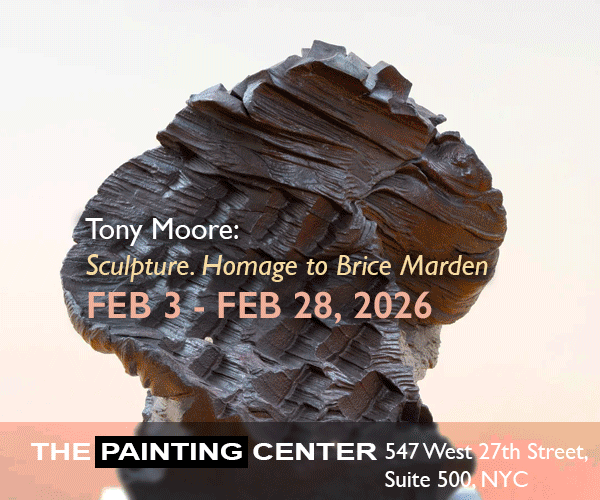

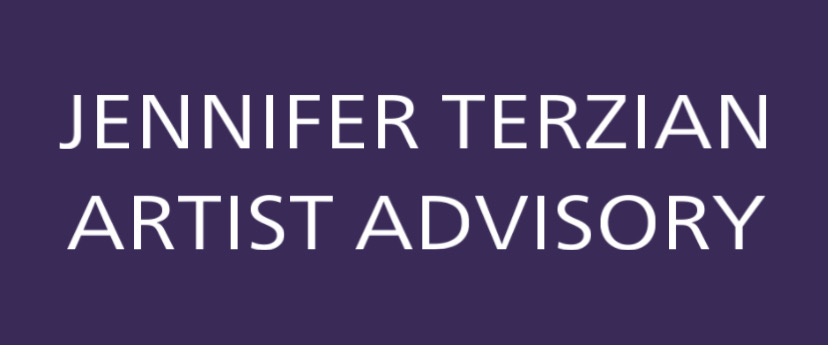

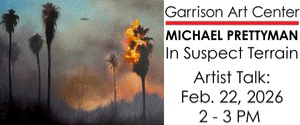
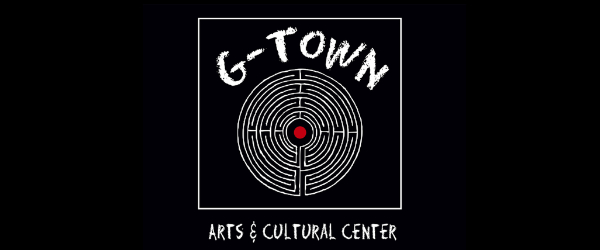











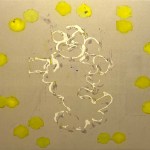
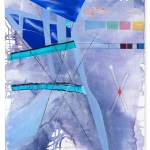

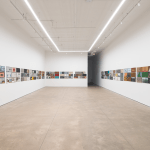
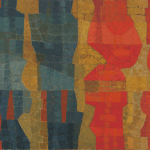
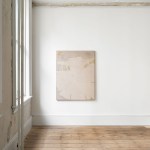
This is certainly the first time I’ve seen the Socratic dialogue incorporated into a work of fiction. Brava, Laurie!
Great story Laurie. Well written and an enjoyable read. Philosophical conversations about abstraction, not a common subject. But do artists really correct nature? It made me smile. Thank you
More than a volcanic pimple is about to erupt. Bernard seems headed for a big change.
thank u. i use my mind so rarely.
Laurie,
Loved the story. I was reminded of why I liked your stuff that you used to write for The Common Review.
Back in the day.
Dan